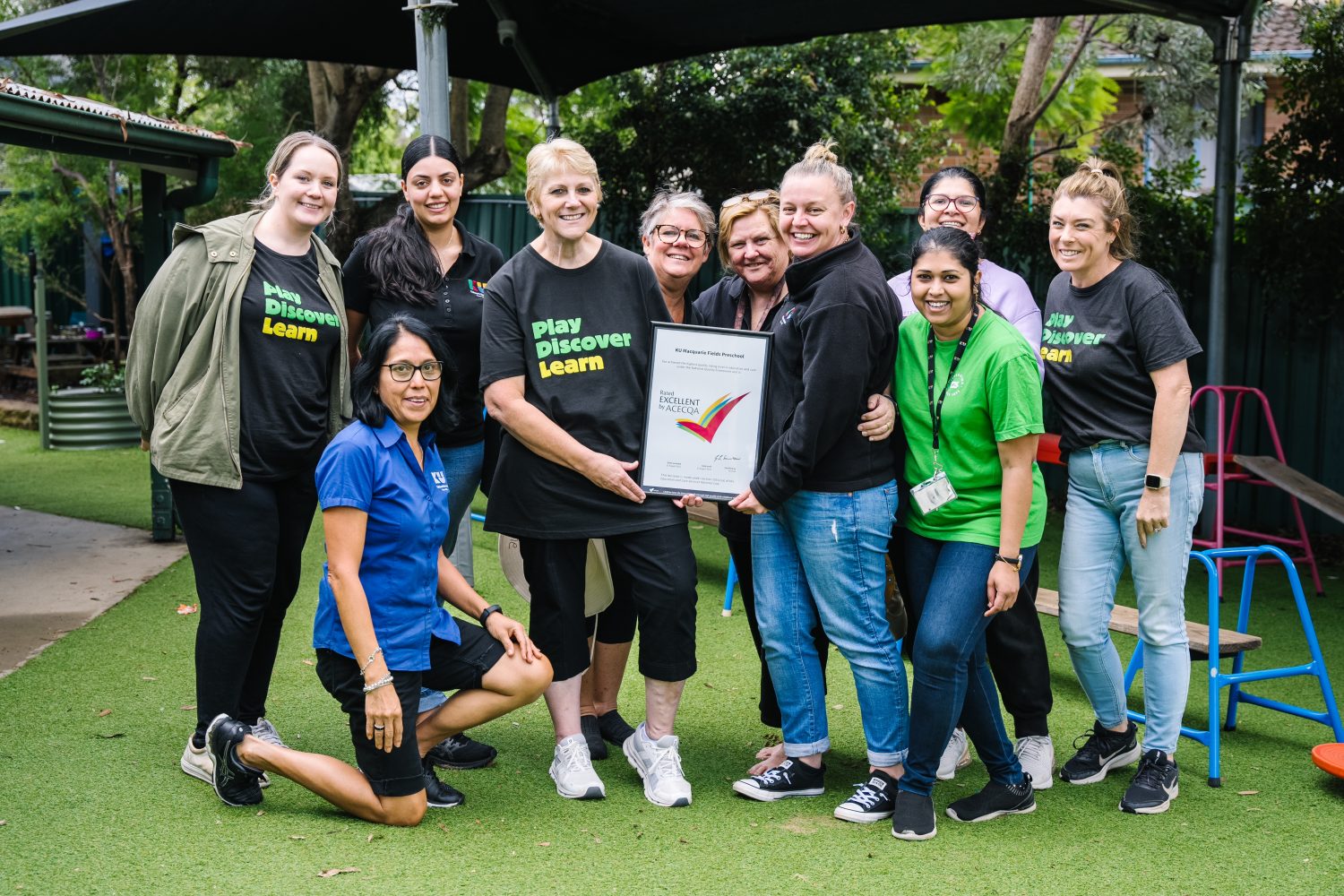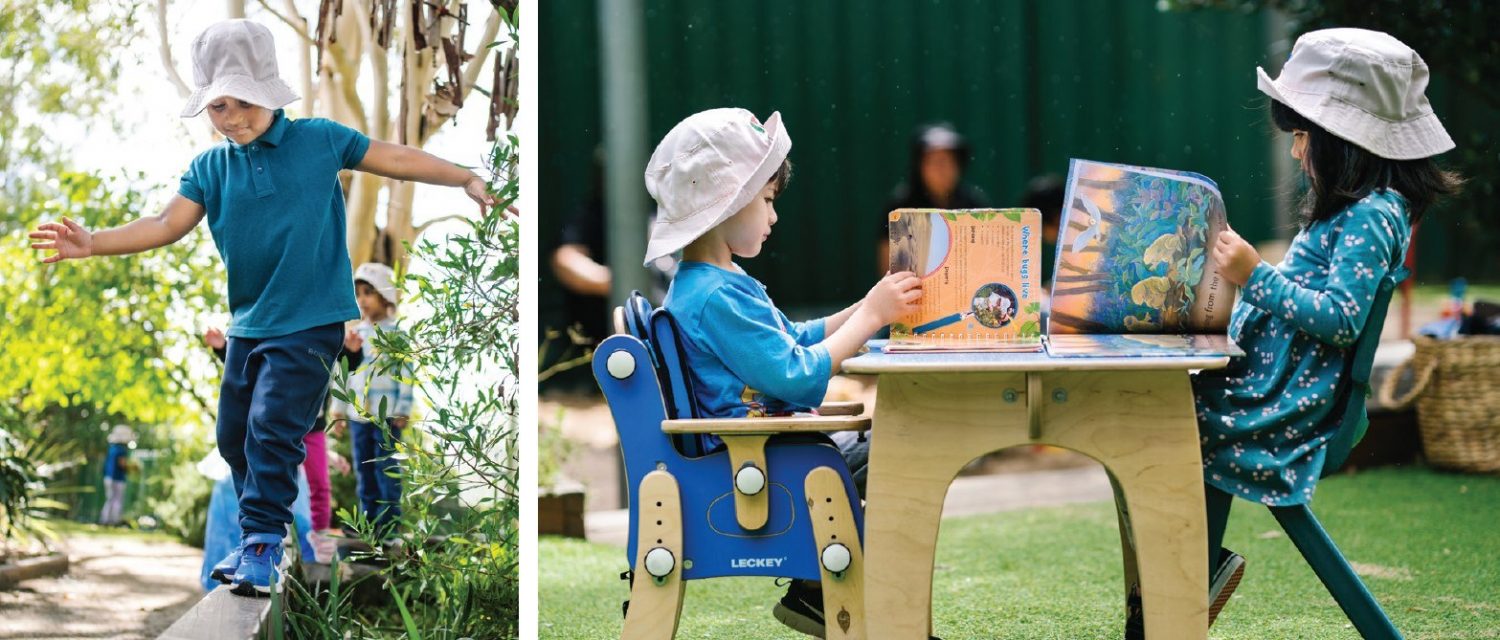“As a leader in the sector, KU Macquarie Fields Preschool ensures its positive impact reaches beyond its children and families by tailoring its service’s practices to meet the needs of its local community.” - ACECQA 2022
KU Macquarie Fields Preschool has experienced significant change over the last five years. The preschool is located in South Western Sydney within a richly diverse community with more families from culturally and linguistically varied backgrounds, including an increasing number of Aboriginal and Torres Strait Islander children and families.
In 2022, of the 100 enrolled children, 42 were diagnosed with a range of additional needs and each was funded under the Preschool Disability Inclusion Support Funding.
Director Jackie Staudinger and her team were delighted to be acknowledged in August 2022 when KU Macquarie Fields Preschool was awarded the Excellent rating by the Australian Children’s Education and Care Quality Authority (ACECQA).
“As a leader, I’m honoured to have received this recognition,” said Jackie. “I’m proud to work alongside a team of educators who collaboratively invest skills in exceptional practice.”
At the time, it was only the fifth service in 2022 to receive what is the highest rating a service can achieve under the National Quality Standard, and just one of 38 to hold the rating across the entire country.
Exemplary practice
KU Macquarie Fields demonstrated exemplary practice across three themes, including inclusive partnerships with children and families; collaborative partnerships with professional, community or research organisations; and practice and environments that enhance children’s learning and growth.
An innovative initiative identified by ACECQA was a healthy eating program offering KU Macquarie Fields’ community information about nutrition, food purchasing, budgeting, cooking lessons, recipes and foodbank locations.
The team was also acknowledged for embedding the Marte Meo approach to enable educators and families to support children’s strengths and communication cues. The team held frequent meetings to support pedagogy and dialogue around practice, ethical decision making, and responsive engagement with families.
ACECQA also identified the evidence of rich partnerships between the service, families and professionals that worked to co-design targeted individualised programs for each child. These included focused support by staff in the coordination of, and participation in, meetings with internal and external specialists and inclusion agencies to support each child’s learning and wellbeing.
Inclusive practice in action
Jackie and the team ensures the preschool provides a safe and secure environment which nurtures and further develops each individual child’s sense of “Belonging, Being and Becoming”.
“Families from many diverse cultures across the community access quality early education, opportunities for hope and growth,” says Jackie. “Families are connected and supported by interagency services. The preschool is committed to providing long lasting social impact by having support services working together, to make a difference to the lives of children and families in their community.”
Educator Kerry Fowler has been at KU Macquarie Fields for a decade. Over the years she’s seen the effort and reward of creating a flexible service, one that is open to change and welcoming diversity.
“At KU Macquarie Fields, we continue to challenge ourselves, reflect how can we do it better, ask ourselves where to next. We are continually listening to our community and identifying what their needs are,” says Kerry.
“Ten years ago, the centre was 20 places with low enrolments and a minimal waiting list. Fast forward now to a thriving service of 40 places with more than 350 children on the waitlist,” she says.
“I personally feel a sense of excitement from our community and the opportunity of servicing all children, from typically developing to those with additional needs. Everyone is ‘One of the Kids’,” Kerry says.
Christine Lee, an Early Childhood Teacher, has spent the past four years at KU Macquarie Fields and speaks on behalf of the team about their drive to deliver excellence to the families.
“KU Macquarie Fields has the X factor, that missing piece,” says Christine. “The camaraderie and professional identity that all the educators have established is palpable.”
“We have a sense of understanding our families’ needs as well as really knowing our children and supporting their learning by providing a holistic approach to each child’s developmental journey,” she says.
“It’s about wanting to learn more. Being present and available and accepting of professional development, then using your knowledge to create an enthusiasm that is shared with your colleagues,” says Christine.
Centre of Influence
KU Macquarie Fields has demonstrated leadership in their community that has impacted the lives and learnings of children, families and stakeholders. A strong commitment to inclusion informs their pedagogical decision making and aspirations to continue to work toward quality improvement, both for their own practice and as a model for the sector.
“As a Centre of Influence, we must continually ask who we are influencing. We need to continue to advocate for children and their families, provide the best model we can to the early childhood sector and dominate in influencing change,” says Christine.
“I believe KU Macquarie Fields sets an example of what possibilities there are for all services. What we do is embedded in practice. It is not just for a sunny day. We are all involved in decision making and share in responsibilities for reflection and planning,” she says.
Nothing’s impossible!
The KU Macquarie Fields team has a strong belief that nothing is impossible. The team loves a challenge. They enjoy finding solutions through new perspectives and seeking expert help. This is the key to being able to be open to accepting every family and child on their own terms, making preschool a culturally safe and inclusive space that is judgement free and promotes respect.
Educator Paula Hind, while proud of the team’s accomplishment, is humble and says this is “just the day-to-day”.
“What we do is not considered out of the ordinary for us and our Excellent rating doesn’t change that. We are simply being responsive to our community’s needs. It’s our ethical responsibility really,” she says.
KU Macquarie Fields’ interactions are always welcoming and has relationships as their foundation. That’s what gives families a strong sense of community and belonging.


